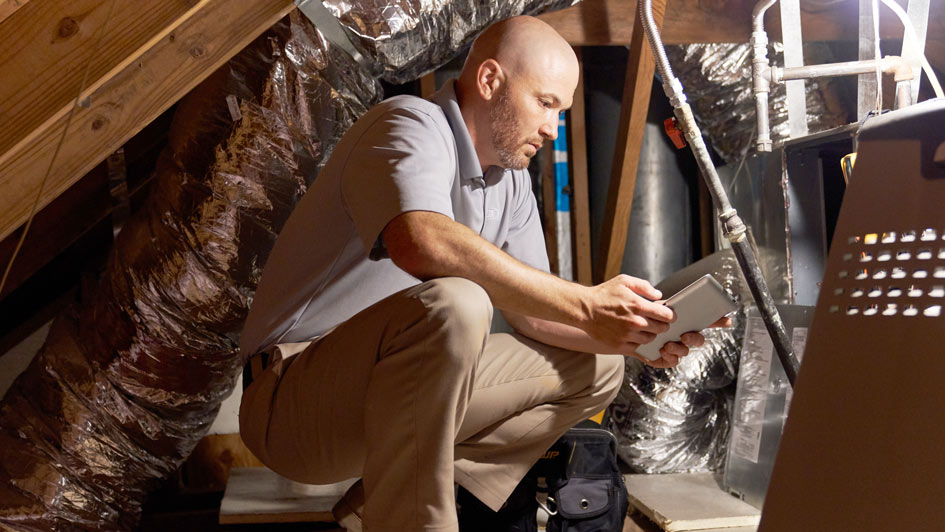
Did you know that more than 50 percent of your home’s energy costs are needed for your heating and cooling? That’s why it’s essential to secure an energy-efficient HVAC system.
Furnace efficiency standards were last revised to an Annual Fuel Utilization Efficiency (AFUE) rating of 80% in 2015. This rating system calculates how effective your furnace is at combusting natural gas into heat. An AFUE rating of 80% means your furnace loses about 20% of the fuel it uses while generating heat.
In 2022, President Biden proposed new energy-efficiency standards for residential gas furnaces that would substantially decrease emissions, save homeowners money and encourage sustainability.
These revised standards are projected to:
- Save Americans $1.9 billion annually.
- Reduce carbon emissions by 373 million metric tons and methane emissions by 5.1 million tons over three decades, the equivalent of what 61 million homes emit each year.
Starting in 2029, the updated rule would mandate all new gas furnaces to feature AFUE ratings of 95%. This means furnaces would combust nearly 100% of the gas into usable heat.
With these facts in mind, you may be asking yourself "what happens to my existing furnace"? For the time being, very little, as the proposed rule won't go into effect until 2029 at the earliest and will not affect furnaces that are already in use.
But if you are considering furnace replacement in soon, highly energy-efficient furnaces are ready and available. Find out how these furnaces can lower your monthly energy bills.
Guide to Condensing Furnaces
How Condensing Furnaces Work
A condensing furnace is a kind of heating system that uses a secondary heat exchanger to capture wasted heat from the furnace's exhaust gases. This decreases the amount of energy wasted, enhances energy efficiency and lowers CO2 emissions. It also involves less natural gas to generate the same amount of heat in comparison to other types of furnaces.
How Condensing Furnaces Differ from Non-Condensing Furnaces
The biggest difference between a condensing furnace and a non-condensing furnace is condensing models use a secondary heat exchanger to gather any wasted heat from its exhaust gases, while the other does not.
Expected Longevity of a Condensing Furnace
The life span of a condensing furnace depends on the brand, model and other factors. In most cases, a condensing furnace will last between 10-20 years with sufficient maintenance and regular service. If you put off scheduled maintenance, the unit may have a significantly shorter life span.
Why Condensing Furnaces Cost More
Generally, condensing furnaces type of system is a lot more efficient than traditional furnaces, as it only consumes the minimum amount of energy required to heat your home, resulting in more savings on your utility bill.
The majority of variable-speed furnaces are condensing furnaces, although some are available in non-condensing models with lower AFUE ratings. In order for a furnace to be classified as a condensing furnace, it must offer an AFUE rating of 90% or higher.
Do Variable-Speed Furnaces Run All the Time?
A variable-speed furnace doesn’t need to stay on all the time. Alternatively, it runs at different speeds based on the temperature in your Muskogee home as well as the amount of energy it requires to reach that temperature.
When sufficient energy is necessary to maintain your desired temperature level, the furnace will shift to a higher speed to handle the demand. Doing this will ensure more efficient heating in your home while also providing quieter operation.
Guide to Two-Stage Furnaces
Two-Stage Furnaces: What They Are and How They Work
A heating system with two settings of operating - high and low - is called a two-stage furnace. When set to the low stage, the furnace runs at a reduced capacity in order to maintain the preferred temperature for your home more efficiently. During the high stage, the furnace will instead run at maximum capacity to satisfy demands for greater heat. With a two-stage furnace, you can maintain improved energy efficiency and steady temperatures throughout your home.
While two-stage furnaces are very efficient, not all all models are condensing furnaces.
Does a Two-Stage Furnace Run All the Time?
A two-stage furnace should not run constantly. In the low stage of operation, the furnace runs at diminished capacity in order to retain a planned temperature more efficiently within your home. When more energy is needed to maintain the set temperature, the unit shifts to its high stage and runs at full capacity. As a result, two-stage furnaces are powerful enough to help reduce energy costs without operating constantly.
Differences Between Two-Stage and Variable-Speed Furnaces
Two-stage furnaces have two stages of functionality, low and high. During the low stage, the furnace runs at reduced capacity in order to sustain a desired level of comfort within your home. When more warmth or cooling is desired, the furnace will shift to its high stage and operate at peak capacity.
Variable-speed furnaces, meanwhile, can operate at multiple speeds in order to uphold a more precise temperature at home. As such, variable-speed furnaces offer greater savings on your utility bills .
Differences Between One- and Two-Stage Furnaces
One-stage furnaces have a single stage of operation and operate either at full power or not at all. This means that the furnace runs constantly in order to maintain a desired level of comfort at home.
Conversely, two-stage furnaces have two stages of operation, low and high. During the low stage, the furnace runs at reduced capacity in order to maintain the desired temperature more efficiently. When a greater demand for warmth or cooling is needed, the furnace will change over to its high stage and operate at full capacity.
Make Your Furnace Installation Appointment with Hix Air Conditioning Service, Inc. Today
Modern furnace technology can be confusing. That’s why Hix Air Conditioning Service, Inc. professionals are here to help with a free, no-pressure estimate for furnace installation. We’ll assess your home, your heating needs and your budget before helping you find the right solution. Call us at 918-682-8238 to get started today!
